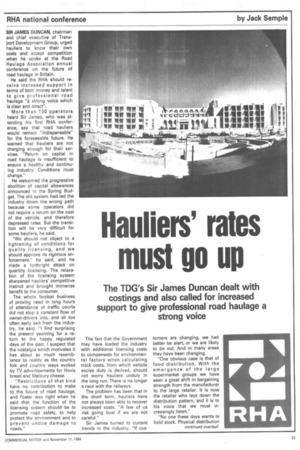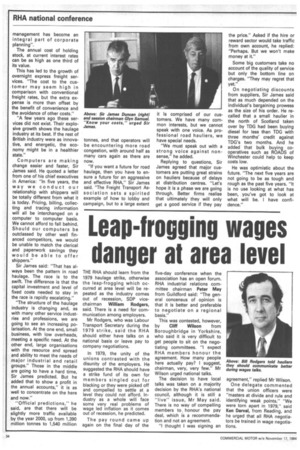Hauliers' rates must go up
Page 35

Page 36

If you've noticed an error in this article please click here to report it so we can fix it.
The TDG's Sir James Duncan dealt with costings and also called for increased support to give professional road haulage a strong voice
SIR JAMES DUNCAN, chairman and chief executive of Transport Development Group, urged hauliers to know their own costs and accept competition when he spoke at the Road Haulage Association annual conference on the future of road haulage in Britain.
He said the RHA should receive increased support in terms of both money and talent to give professional road haulage "a strong voice which is clear and direct".
More than 100 operators heard Sir James, who was attending his first RHA conference, say that road hauliers would remain "indispensable" for the foreseeable future. He warned that hauliers are not charging enough for their services. "Return on capital in road haulage is insufficient to ensure a healthy and continuing industry. Conditions must change."
He welcomed the progressive abolition of capital allowances announced in the Spring Budget. The old system had led the industry down the wrong path because some operators did not require a return on the cost of the vehicle, and therefore depressed rates. But the transition will be very difficult for some hauliers, he said.
"We should not object to a tightening of conditions for quality licensing, and we should approve its rigorous enforcement," he said, and he made a forthright attack on quantity licensing. The relaxation of the licensing system sharpened hauliers' competitive instinct and brought immense benefit to the consumer.
The whole farcical business of proving need in long hours of attendance at traffic courts did not stop a constant flow of owner-drivers into, and all too often early exit from the industry, he said. "I find surprising the present yearning for a return to the happy regulated days of the past. I suspect that the nostalgia which motivates it has about as much resemblance to reality as the country folk and country ways evoked by TV advertisements for Hovis bread and Melbury cheese.
"Restrictions of that kind have no contribution to make to the future of road haulage, and Foster was right when he said that the function of the licensing system should be to promote road safety, to help protect the environment and to prevent undue damage to roads." The fact that the Government may have loaded the industry with additional licensing costs to compensate for environmental factors when calculating track costs, from which vehicle excise duty is derived, should not worry hauliers unduly in the long run. There is no longer a race with the railways.
The problem has been that in the short term, hauliers have not always been able to recover increased costs. "A few of us risk going bust if we are not careful."
Sir James turned to current trends in the industry. "If cus tomers are changing, we had better be alert, or we are likely to be out. And in many areas they have been changing.
"One obvious case is that of food distribution. With the emergence of the large supermarket groups we have seen a great shift in bargaining strength from the manufacturer to the large retailer. It is now the retailer who lays down the distribution pattern, and it is to his voice that we must increasingly listen."
"No one these days wants to hold stock. Physical distribution continued overleaf management has become an integral part of corporate planning".
The annual cost of holding stock, at current interest rates can be as high as one third of its value.
This has led to the growth of overnight express freight services. "The cost to the customer may seem high in comparison with conventional freight rates, but the extra expense is more than offset by the benefit of convenience and the avoidance of other costs."
"A few years ago these services did not exist. Their explosive growth shows the haulage industry at its best. If the rest of British industry were as innovative, and energetic, the economy might be in a healthier state."
Computers are making change easier and faster, Sir James said. He quoted a letter from one of his chief executives in America: "In five years, the way we conduct our relationship with shippers will be totally different from what it is today. Pricing, billing, collecting and tracing information will all be interchanged on a computer to computer basis. We cannot afford to fall behind. Should our computers be outclassed by other well financed competitors, we would be unable to match the clerical and paperwork savings they would be able to offer shippers."
Sir James said: "That has always been the pattern in road haulage. The race is to the swift. The difference is that the capital investment and level of fixed costs needed to stay in the race is rapidly escalating."
"The structure of the haulage industry is changing and, as with many other service industries and professions, we are going to see an increasing polarisation. At the one end, small business, with low overheads, meeting a specific need. At the other end, large organisations with the resource and spread and ability to meet the needs of major industrial and retail groups." Those in the middle are going to have a hard time, Sir James predicted. But he added that to show a profit in the annual accounts," it is as well to concentrate on the here and now."
"Official predictions," he said, are that there will be slightly more traffic available by the year 2000, up from 1,390 million tonnes to 1,540 million tonnes, and that operators will be encountering more road congestion, with around half as many cars again as there are now.
"If you want a future for road haulage, then you have to ensure a future for an aggressive and effective RHA," Sir James said. "The Freight Transport Association sets a spirited example of how to lobby and campaign, but to a large extent it Is comprised of our customers. We have many common interests, but we cannot speak with one voice. As professional road hauliers, we have special needs.
"We must speak out with a strong voice against nonsense," he added.
Replying to questions, Sir James agreed that major customers are putting great strains on hauliers because of delays at distribution centres. "Let's hope it is a phase we are going through. Better firms realise that ultimately they will only get a good service if they pay the price." Asked if the hire or reward sector would take traffic from own account, he replied: "Perhaps. But we won't make money at it."
Some big customers take no account of the quality of service but only the bottom line on charges. "They may regret that yet."
On negotiating discounts from suppliers, Sir James said that as much depended on the individual's bargaining prowess as the size of his order. He recalled that a small haulier in the north of Scotland taken over by TDG had been buying diesel for less than TOG with three months' credit against TDG's two months. And he added that bulk buying cooperatives such as ROADS of Winchester could help to keep costs low.
He was optimistic about the future. "The next five years are not going to be as tough and rough as the past five years. "It is no use looking at what has been, you've got to look at what will be. I have confidence."












































































































